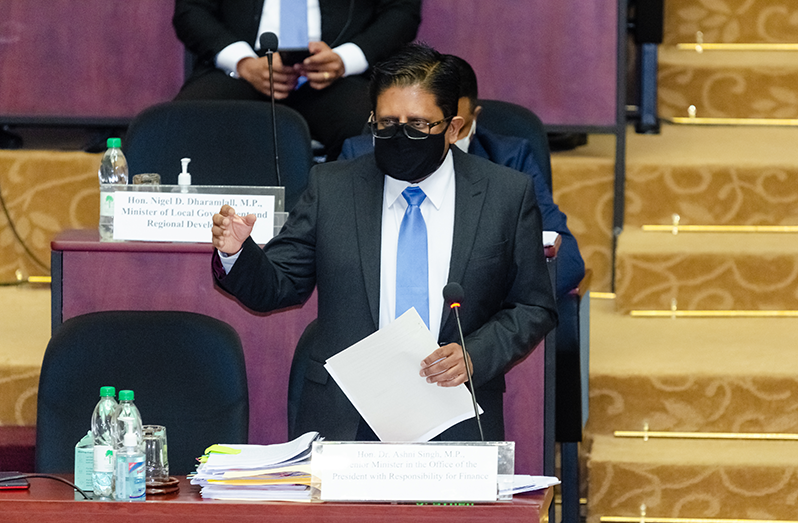THE government majority of the National Assembly has voted in favour of further amendments to the Fiscal Management and Accountability Act (FMAA) which was passed in 2003 and later amended in 2015 under the APNU+AFC administration.
Thursday’s motion to make additional modifications to the Act was brought by Dr. Ashni Singh, Senior Minister in the Office of the President with responsibility for Finance, who sought to undo some of the 2015 amendments to the Act.
In presenting his motion, Dr. Singh said that the proposed alterations to the important legislation will increase the efficiency and effectiveness as it relates to the presentation and consideration of the budget for constitutional agencies. In its current amended form, Singh said that the FMAA has resulted in the budget process being unnecessarily long.
“The amendment laid out a two-stage process whereby the budget of the constitutional agencies would be brought to the National Assembly, considered and approved by the Assembly, and incorporated into the national budget, which would subsequently be submitted to the House for consideration, at which time the budget of the constitutional agencies, would not be reconsidered, but would form part of the national budget,” Dr. Singh explained.
He noted that the 2021 amendment sought to remove the aforementioned two-stage process and replace it with a single, summarised process of submitting and considering budgets for Guyana’s constitutional agencies.
In his arguments, Dr. Singh said that certain fiscal responsibilities are best handled by the Executive. This, he said, is appropriately demonstrated in Article 171 of the Constitution, which states that certain matters relating to public finances, including the levying of taxes, can only be brought before the House signified by a minister.
CURTAILED THE EXECUTIVE’S ROLE
“What the 2015 amendment did was curtail the Executive’s role and those budgets no longer came to the National Assembly with the signature of consent from Cabinet, as is required by the Constitution. Instead, it was submitted to the offices of the Clerk of the National Assembly,” Dr. Singh told the National Assembly.
He said that the responsibility of managing public finances and achieving fiscal outcomes rest with the Minister of Finance and the government of the day. The Finance Minister pointed to the fact that the 2015 amendment violated the principle of involving the Executive in the management of the public financing.
“The underlying principle is that if we will hold the Executive accountable to fiscal output, the Executive must have responsibility for the achievement of those output[s],” Dr. Singh noted. In providing further context, the minister said that Article 222 (a) of the Constitution was very clear when it said, “in order to assure the independence of the entities listed in the third schedule, the expenditure of each of the entities shall be financed by the direct charge of the consolidated fund determined as a lump sum by way of an annual subvention approved by the way of the National Assembly, after a review and approval of an entity’s annual budget as part of the process of determination of the national budget.”
Adding his voice to the elaborate debate, Attorney-General and Minister of Legal Affairs, Anil Nandlall, said that in addition to infringing on the powers vested onto the Executive, the 2015 amendments had also clashed with the Constitution of Guyana.
EVADE SCRUTINY
The previous amendments, according to Nandlall, also paved the way for billions of dollars to evade Parliamentary scrutiny.
“Simply put, this Act that they passed in 2015 in relation to constitutional agencies, they took that power from the President and they give it to the constitutional agencies to present budgetary estimates,” the AG summarised. He also pointed to the fact that Guyana’s financial structures mimic those that exist in 49 other countries across the Commonwealth.
“Let them point to one country, one country in the British Commonwealth, where you have agencies coming by themselves outside of the Executive Government to present budgets. Let them point to one. They cannot, because it doesn’t exist,” Nandlall asserted.
The proposed 2021 amendments were heavily criticised by the Main Parliamentary Opposition, which continued its defence of the 2015 amendments that sought to remove powers from the minister, and have the constitutional agencies present their budgets without the requisite endorsement from the Executive.
Opposition Member of Parliament, Juretha Fernandes maintained that the FMAA in its current form is comprehensive, and that the government had “no reasonable explanation” to amend the already amended Bill. Following the debate, the motion to amend the FMAA was eventually passed, in the absence of the Parliamentary Opposition.




.png)









